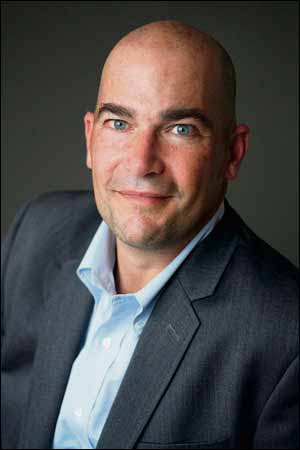|
PROFILE Doctor chronicles ‘beautiful’ life in Israeli hospital | |
MANY of Israel’s haters would have it that the Jewish state is a racist and apartheid country.
Yet time and time again that prejudiced theory is disproved throughout Israel’s institutions — and none more so than in its hospitals, where Arab patients are treated alongside Jewish patients. And Elisha Waldman’s work at Jerusalem’s Hadassah Hospital is a prime example of it. The paediatric oncologist has written about his seven years there in This Narrow Space: A Pediactric Oncologist, His Jewish, Muslim and Christian Patients and a Hospital in Jerusalem (Schocken, £19.99), which is published on Tuesday. New York-raised Elisha told me: “It was beautiful in our department because an effort was created at making a sheltering bubble where everyone felt comfortable, despite the fact that they were facing these horrible diseases. “We tried not to let the challenges of the region affect what we were doing in the hospital.” Elisha’s book rose out of an essay he wrote soon after he had finished officer training in the Israeli army, during the incursion of Gaza at the end of 2008. “I was also in charge of the oncology department at Hadassah at the same time, so I felt this tug of identity,” he said. “There were also moments, when things were a little more intense in the region, that people in the hospital put their heads down, so to speak, but there were never any major outbursts.” The 45-year-old, who is now associate chief in the division of paediatric palliative care at the Ann and Robert H Lurie Children’s Hospital of Chicago, was raised in a traditional Jewish family. His father, Leon, was a Conservative rabbi. “I spent a lot of time as a youngster in Israel and was raised in a Liberal Zionist home,” Elisha recalled. “We were taught to love America deeply, but also to aspire to the Zionist enterprise.” He read medicine at Yale University, before receiving his medical degree from the Sackler School of Medicine, in Tel Aviv. He finished his oncology training at the Mount Sinai Medical Center and Memorial Sloan Kettering Cancer Center in New York, and at Boston Children’s Hospital. Elisha’s move to Hadassah came during his training in the Big Apple. “One of my trainers was friendly with Mickey Weintraub, who was head of oncology at Hadassah,” Elisha recalled. “He connected us and then I was offered the job. It was an absolute dream come true.” He started at Hadassah working as a paediatric oncologist, in charge of children with sarcoma, which are cancers that develop in the muscle, bone, nerves, cartilage, tendons, blood vessels and the fatty and fibrous tissues. He treated all children, whether they were Jewish, Muslim or Christian, and from all areas, such as Tel Aviv, Mea Shearim, Ramallah or Gaza City. Elisha added: “When I moved to Israel, my friends in the States said to me how it must be fascinating helping Palestinian kids. “However, the truth is, the most challenging people to get my head around were those from the ultra-Orthodox community. “Ostensibly, they are my own people, but they are isolated and hold themselves apart in a way which was hard to get my head around at times. “I would sit there with ultra-Orthodox parents and tell them about the next step in their child’s treatment and they would be like, ‘OK, we need to speak to our rabbi.’ “I would say, ‘what are you talking about? This is the next step in treatment for a life-threatening cancer?’. “It took me a while to loosen my rigid and Western stance of ‘I am the physician in charge here’.” Elisha spoke Hebrew fairly well before he landed his position at Hadassah, but had to pick up the technical jargon pretty quickly. He also attempted to learn some Arabic. “I felt I needed to do that in terms of creating a relationship with the children’s parents, as in showing good will,” Elisha explained. It was while in Israel that he met his wife, Oxford-born Sasha. They were introduced by friends and are now parents to 18-month-old Lev, with another baby due in April. Elisha had to leave Israel in 2014 due to financial issues at Hadassah, but he said his heart will always remain in the Jewish state. He added: “I do harbour fantasies about going back to Israel, but, frankly, I don’t think I could enter the Israeli medical system again. “My experiences of dealing with the Ministry of Health while I was working at Hadassah were not positive. “However, if a wealthy philanthropist was to give me a large cheque and asked me to set up a paediatric palliative care service in Israel, which would be insulated from all the bureaucracy, I would have to think about it.” This Narrow Space chronicles the bureaucracy he faced as well as the ever-present threat of full-scale war, and the cultural clashes that sometimes spilled into his clinic. He also writes about his struggles with his own questions of identity and belief.
|
